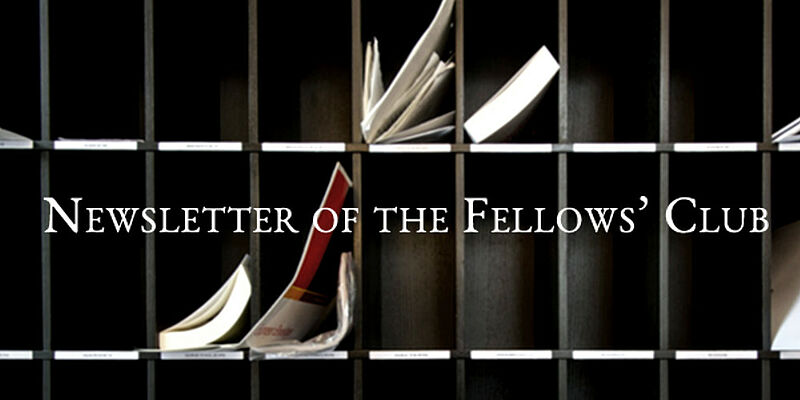
Editorial
The Wissenschaftskolleg is turning 40. Birthdays divisible by 10 are occasions to recollect and take stock. Has the Kolleg remained young? Aged well or poorly? Moved with the times? For this jubilee newsletter, we browsed a little in the archives and talked to two contemporary witnesses: the sociologist of science Helga Nowotny, who was a Fellow in the very first class of 1981/82, and Wolfgang Neudorfer, the IT specialist and longest-serving Wiko staff member.
What has changed? During Wiko’s founding phase, a SPIEGEL magazine article sneered at the cult of academic heroes and the elitist sequestration in Grunewald, criticized the self-sacralization of intellectuals, and wrote maliciously that the newly founded Kolleg aimed to “fan a breath of intellectual tailwind to the divided city with its demolited image”. The situation is different in 2021. Berlin is no longer a divided city and no longer needs any intellectual tailwind. Between 1981 and 2021 not only Germany’s reunification took place, but also the world’s digitalization. Wolfgang Neudorfer shines a spotlight on both revolutions’ consequences for daily practical life: there were times when e-mails from the Kolleg had to be recorded on storage media and transported by car across East Germany to West Germany. Back then several secretaries were busy typing the Fellows’ manuscripts. Unlike the secretaries, the overwhelming majority of the Fellows, who were still officially called “research members” at the time, were male. Diversity was explicitly desired already in 1981, but above all in terms of the Fellows’ nationality. Disciplinary diversity, in contrast, was limited. The first cohort included not a single natural scientist; in 2018/19, they formed half the class. Gender proportions were not even a topic in 1981; in the class of 1981/82, Helga Novotny was one of a total of two women; the 2020/21 cohort has more female than male Fellows, for the first time.
If we read how the German Science Council evaluated the freshly established Kolleg, what is most noticeable is its institutional continuity. The evaluation says that the Kolleg’s legitimacy is based on “fostering the individual researcher in his scientific or scholarly work and development”, offering the possibility “to carry out research plans without the burden of teaching or administrative work, without being tied to institutional aims, and thereby [...] receiving stimuli from other fields [...] across disciplinary boundaries in informal, long-term communication”. Nothing about this concept has changed. Transcending disciplinary boundaries remains a challenging goal. The informality of the communication, however, has clearly increased. In 1981, meals were taken on a long table under the chairmanship of the Rector, who chose whom to give the floor to (photo from the archive?). The written suggestion from Nicolaus Sombart (Fellow 1982/83) to lend meals even more ceremonial dignity and in particular to provide more wine found only partial support. Happily, his diagnosis of a “dangerous tendency that everyone is finished with his tray much too fast and leaves the table prematurely” did not prevail.
The services offered to the Fellows have gradually been adjusted to fit changing needs. The library could no longer get by without close cooperation with the IT department – which didn’t even exist yet in 1981. But the Fellows still enjoy the luxury that the book treasures of all of Berlin’s libraries are at their disposal, and not only virtually, but materially. This will remain the case in the future – even if the departure of Sonja Grund, who is now assuming the directorship of the State Library of Schleswig-Holstein in Kiel, is painful for all of us.
So much for continuity and gradual transformation. The Kolleg doesn’t hide its age, nor does it shy from comparison with the many young Institutes for Advanced Study around it. But then came Corona. The pandemic endangers the very core of what characterizes the Kolleg: international mobility, stable yearly groups, and everyday personal exchange. The Fellows' Club Meeting 2020, too, has fallen victim to the plague, and 2021 will only be possible in reduced format. The masks, whose effects are described by Andreas Dorschel (Fellow 2020/21), were the least of the evils. The loss of everything connected with joint physical presence drastically changed everyday life. The Fellow class of 2019/20 was hit in the last third of its Kolleg year, when it had already grown so close that its solidarity only increased under the limitations. But the Fellow group of 2020/21 arrived under pandemic conditions and was thus much more affected. It is all the more remarkable that (almost) all those who were invited nonetheless came to Grunewald and made the best of quiet contemplation in their offices.
But even if colloquia, lecture concerts, discussion panels, Berlin evenings, and Academic Advisory Board meetings can be held digitally – won’t that ultimately make the Kolleg superfluous as a site of encounter? No – quite the contrary. The pandemic has taught us “there can be no virtual Wissenschaftskolleg” (Helga Nowotny). Even if change accelerates in the Kolleg’s surroundings in the next forty years, optimism about the core of the Kolleg’s philosophy is justified. Because anyone who for months has experienced only virtual meetings without mutual eye contact, without informal coffee break talks, and without the occasional anarchic confusion of mutual interruption has realized all the clearer that joint physical presence is irreplaceable.
Cordially yours,
Barbara Stollberg-Rilinger
Rector of the Wissenschaftskolleg